EigenCloud: Cloud-Scale Programmability, Crypto-Grade Verifiability
Crypto solved scalability but programmability remains the bottleneck. EigenCloud combines cloud-scale programmability with crypto-grade verifiability, enabling sophisticated apps impossible with today's smart contracts.
Imagine AI agents that can book flights and hold insurance bonds for errors. Prediction markets that resolve based on any Twitter announcement. Ride-sharing apps with cryptographically enforced take-rate limits. Online casinos with verifiable randomness instead of "trust me" promises.
These applications are impossible with today's blockchain constraints. Smart contracts are trapped in deterministic environments that prevent the complex logic these applications require.
The real bottleneck isn't transactions per second. It's programmability.
Onchain virtual machines force developers into constrained environments that can't access external APIs, leverage existing software libraries, or provision specialized hardware. These constraints made sense for financial primitives, but they're architectural dead ends for the path crypto needs to reach mainstream adoption.
EigenCloud changes that. Built on EigenLayer, EigenCloud is the first verifiable cloud that combines the programmability of traditional cloud infrastructure with the cryptoeconomic security of blockchains. For the first time, developers can build sophisticated crypto applications without the constraints of onchain VMs.
The Problem: Programmability is Crypto's Last Constraint
Ethereum launched with two fundamental constraints: scalability and programmability. The industry spent a decade solving scalability through Layer 2 rollups, data availability layers, and high-throughput chains. Throughput is no longer the limiting factor.
Programmability remains the bottleneck.
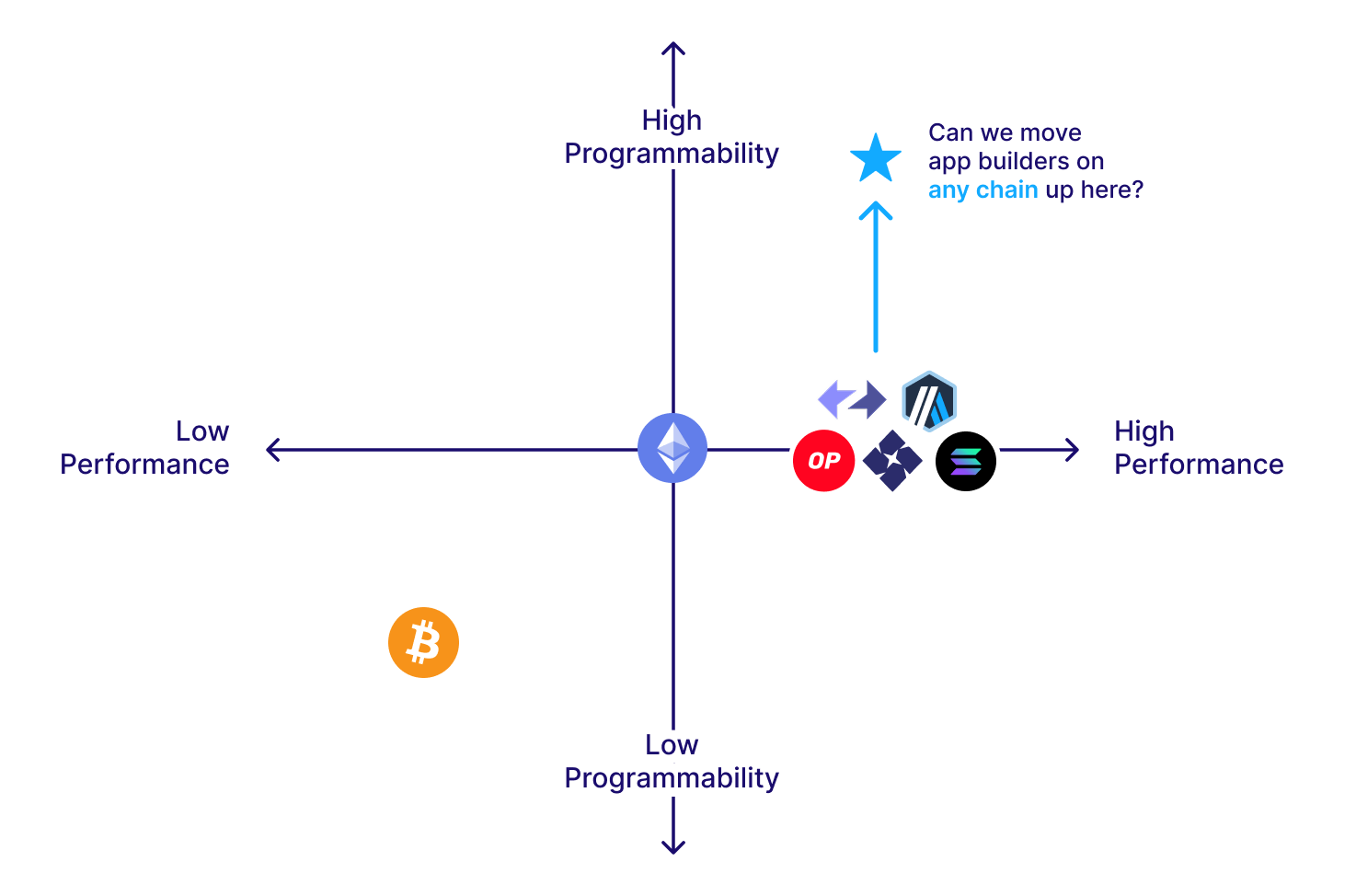
Smart contracts today suffer from four critical limitations that prevent developers from building sophisticated applications:
Software Limitations: Developers can’t directly leverage the richness of off-chain open source software libraries, and existing virtual machines (EVM, WASM, zkVMs) require developers to re-implement software. This constrains the developer base to crypto-native builders (roughly 25,000) instead of the 20+ million software developers worldwide.
Hardware Limitations: The blockchain specifies what hardware code runs on. Developers can't request GPUs for AI workloads, high-performance CPUs for complex computation, or trusted execution environments for sensitive operations. They're stuck with whatever the validator network provides.
Interface Limitations: Blockchains can only trust data that's already onchain or provided via separately secured oracles. Direct, verifiable access to external APIs and real-world state remains an unsolved challenge, forcing developers to architect around these interface gaps.
Consensus Limitations: Blockchain consensus protocols don't allow developers to program how nodes partition work, communicate, or reach agreement. This prevents building features like custom data availability, faster finality, privacy layers, or specialized computation protocols.
These limitations exist for good reasons. Blockchains guarantee tight determinism by constraining execution environments, hardware assumptions, external interfaces, and consensus mechanisms. But determinism that works for financial transactions becomes a straightjacket for complex applications.
The gap is stark: crypto has produced a $3 trillion financial ecosystem, but virtually no mainstream consumer applications.
The Promise: A Verifiable Cloud That Changes Everything
Public clouds set developer expectations for programmable infrastructure: select any software library, provision specialized hardware, stream data through standard interfaces, and assemble production systems from managed services instead of rebuilding commodities like relational SQL databases.
Blockchains offer the opposite trade-off: tamper-resistant execution and token escrow, but only inside tightly constrained onchain VMs. This forces developers to contort complex application logic to fit token-centric architectures, severely limiting what can be built.
EigenCloud bridges this gap by enabling developers to move expressive application logic into verifiable off-chain containers while keeping only minimal consensus-enforced logic onchain. For the first time, developers get cloud programmability with crypto verifiability.
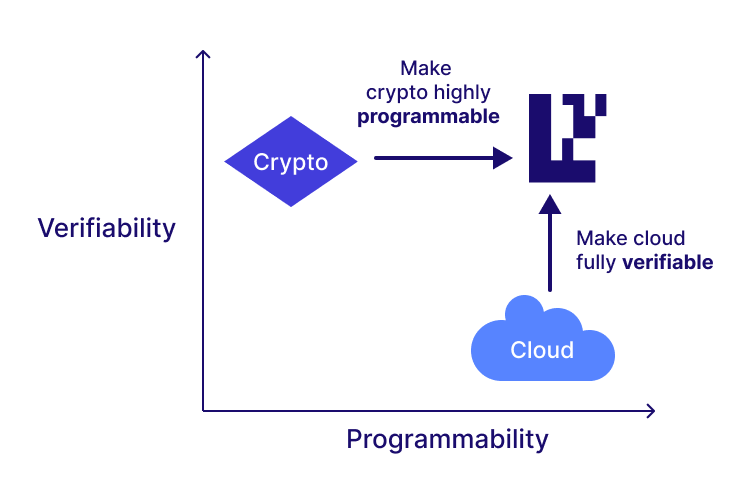
The breakthrough: Developers can now build sophisticated applications that would be difficult or infeasible to implement fully onchain, while maintaining the cryptoeconomic security guarantees that make crypto applications trustworthy.
Similar to how public clouds offer libraries of IaaS, PaaS, and SaaS services "off the shelf," EigenCloud provides a growing catalog of autonomous verifiable services (AVSs) built on EigenLayer. Rather than rebuilding infrastructure from scratch, developers can compose powerful application logic from existing verifiable services—oracles, bridges, AI inference, data processing—without the undifferentiated heavy lifting.
This dramatically expands the application design space, enabling new classes of verifiable software services with richer, more powerful logic than possible with onchain VMs alone.
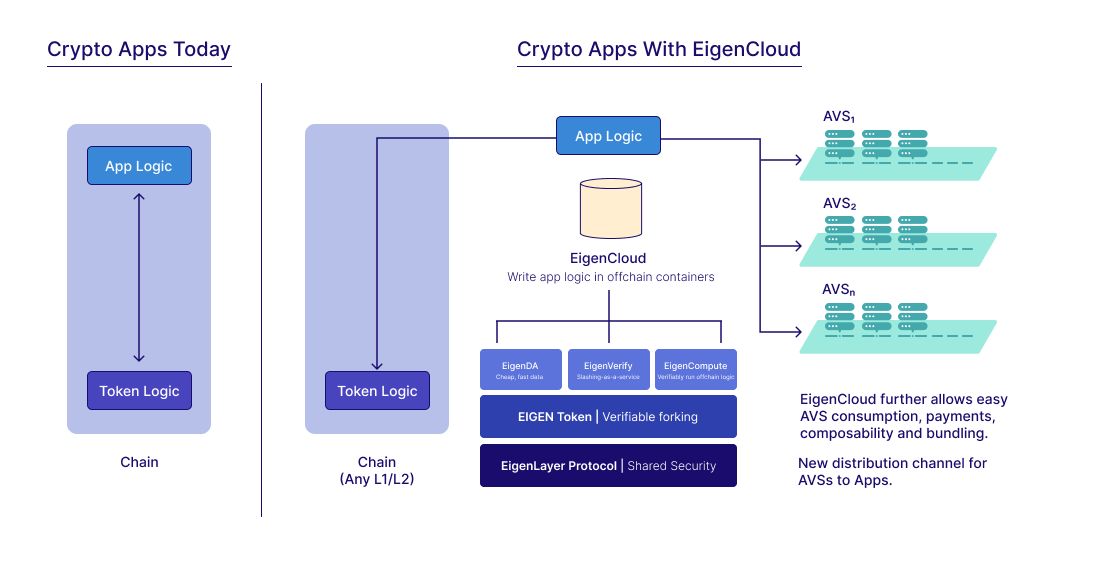
EigenCloud: Four Key Value Propositions for Developers
EigenCloud augments any blockchain with new cloud services that let builders launch full-stack crypto apps as easily as building on traditional cloud, but settled with blockchain-grade trust. EigenCloud simply hosts your off-chain logic in verifiable containers, proves results onchain, and charges only for the security you actually use.
For application developers, EigenCloud delivers four core value propositions:
1. Build Rich, Powerful Applications:
Deploy familiar containers (Docker, Kubernetes, Nomad) and use EigenCloud to cryptographically prove results to onchain smart contracts. You get cryptoeconomic guarantees for complex application logic without writing blockchain code or understanding consensus mechanisms.
2. Use on Any Chain:
Verified outputs trigger state changes on smart contracts across any L1 or L2. Build once, deploy everywhere—blending cloud-grade developer experience with crypto-grade settlement on Ethereum, Solana, Base, Arbitrum, or any blockchain ecosystem.
3. Consume and Compose Existing Services:
Tap into a growing library of autonomous verifiable services (AVSs) with standardized consumption patterns, unified payment models, and consistent trust guarantees. Compose oracles, bridges, AI inference, and data processing without building infrastructure from scratch.
4. Pay Only for Security Consumed:
Configure exactly how much economic security backs each operation. Routine data reads might use minimal security for cost efficiency, while high-value liquidations may have access to billions in security. This granular security model makes verification economically viable across application types.
EigenCloud is a suite of developer tools designed to make building verifiable applications as frictionless as deploying to AWS or Google Cloud, while maintaining the cryptoeconomic security that makes crypto applications trustworthy.
The Product: EigenCloud's Three Primitives
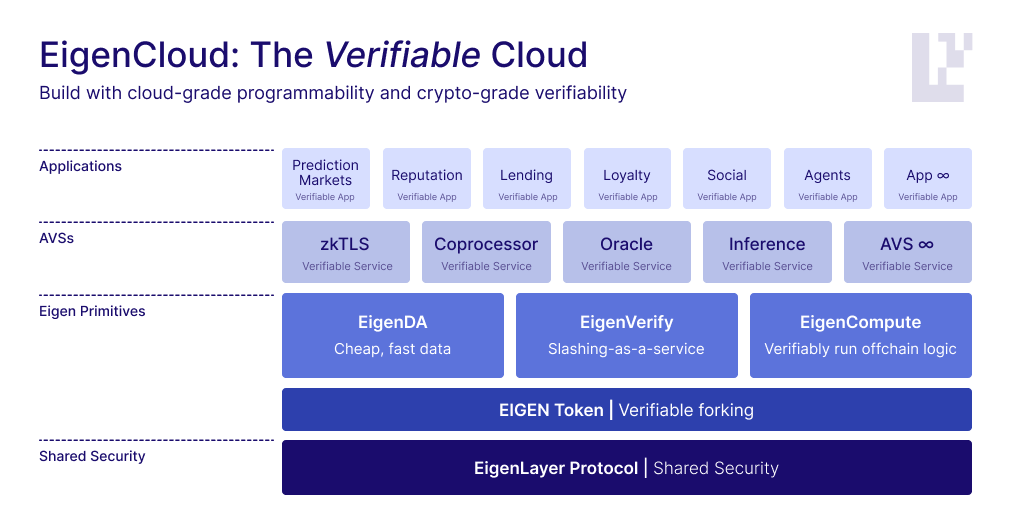
EigenCloud builds on EigenLayer's foundation of shared cryptoeconomic security, extending it through three developer primitives that solve specific problems:
EigenDA: Hyperscale Data Availability
EigenDA ensures that computation data remains available for independent verification. With industry-leading throughput of 50MB/s, sub-10-second latency, and fixed pricing, EigenDA is live on mainnet and already securing billions in value across the rollup ecosystem.
For EigenCloud applications, EigenDA provides the data availability layer that enables any observer to independently verify off-chain computations. Every container execution is recorded to EigenDA, creating a form of audit trail for verification.
EigenVerify: Dispute Resolution-as-a-Service
EigenVerify eliminates the need to write custom fraud proofs by providing ready-to-use dispute resolution for any computation. It supports three powerful verification modes:
- Objective Verification: Deterministic code execution verified through re-execution. If an operator claims a container produced output X, anyone can challenge by triggering EigenVerify to re-run the same container with identical inputs. Objective verification works for any deterministic computation.
- Intersubjective Verification: Tasks where any two rational humans would agree on the outcome, even if they can't be verified algorithmically. Examples include "Who won the presidential election?" or "Does this image contain a cat?" Intersubjective verification uses majority consensus among staked validators, with EIGEN token forking as the ultimate backstop.
- AI-Adjudicated Verification: Disputes resolved by verifiable AI systems, combining the objectivity of algorithmic verification with the flexibility of human judgment. This enables automated adjudication for complex scenarios while maintaining cryptoeconomic guarantees.
EigenVerify is live in devnet with select developers, with mainnet planned for Q3 2025.
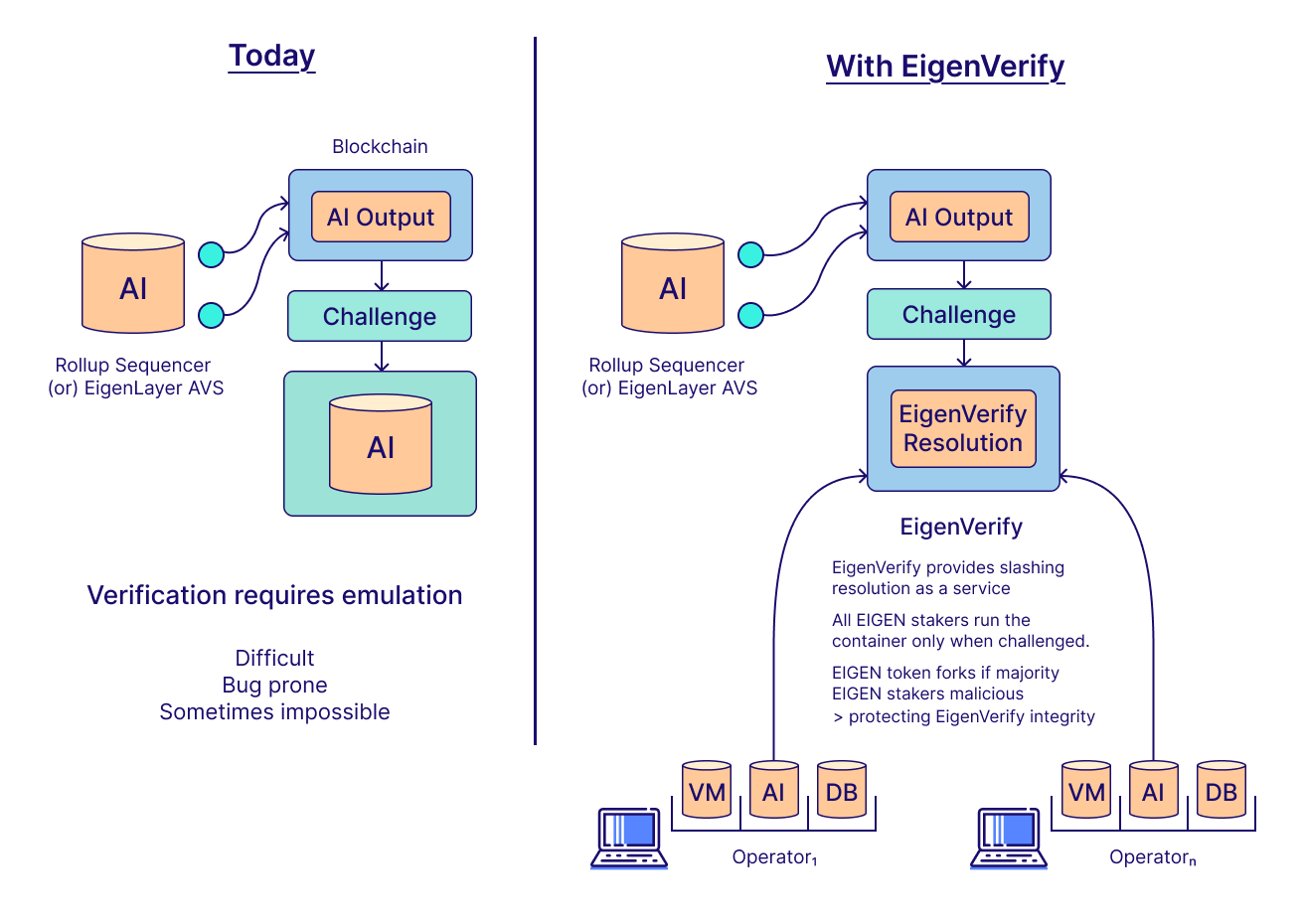
EigenCompute: Container Orchestration with Crypto Security
EigenCompute abstracts the complexity of EigenLayer, EigenDA, and EigenVerify so developers can focus purely on application logic. While building AVSs directly on EigenLayer provides maximum flexibility and control, it requires specialized knowledge of operator coordination, staking mechanics, and pricing models that many application developers prefer to abstract away.
EigenCompute handles two core functions:
Verifiable Off-Chain Computation: Runs containerized application logic with specified economic security and returns results to target blockchains. The process is automated—containers execute on operator sets, data gets written to EigenDA for verification, and signed results are delivered to smart contracts. EigenVerify automatically handles dispute resolution.
Verifiable Service Composition: Enables apps to consume existing AVSs through standardized interfaces with unified payment and trust models. This creates a shared distribution flywheel where more applications drive AVS demand, attracting more service builders and expanding the verifiable services catalog.
EigenCompute enters devnet in Q3 2025, with mainnet by Q4 2025.
EIGEN: The Verifiable Cloud Token
The EIGEN token enables EigenCloud's breakthrough capabilities through its unique forkability mechanism—the first programmable verifiability token in crypto.
Token Forking for Universal Verifiability: As described in the EigenCloud Whitepaper, the key idea underpinning the EIGEN token is forkability: if the majority of the EIGEN token stakers do not perform the task correctly, then the token can be forked and the malicious token stakers slashed. The forkability of the token acts as a deterrent to the malicious behavior of the token holders and keeps the system honest, similar to an L1 token’s role today. When the system functions as expected, then forks will be exceedingly rare.
The EigenCloud Flywheel: EigenLayer created a supply-side flywheel where more stake attracts more AVSs, which generate more compensatory rewards for stakers. EigenCloud supercharges the demand side by expanding verifiable application types (EigenVerify) and making security consumption easier (EigenCompute). As more powerful AVSs get built, novel applications build on them, and as applications proliferate, new AVSs compete for their business.
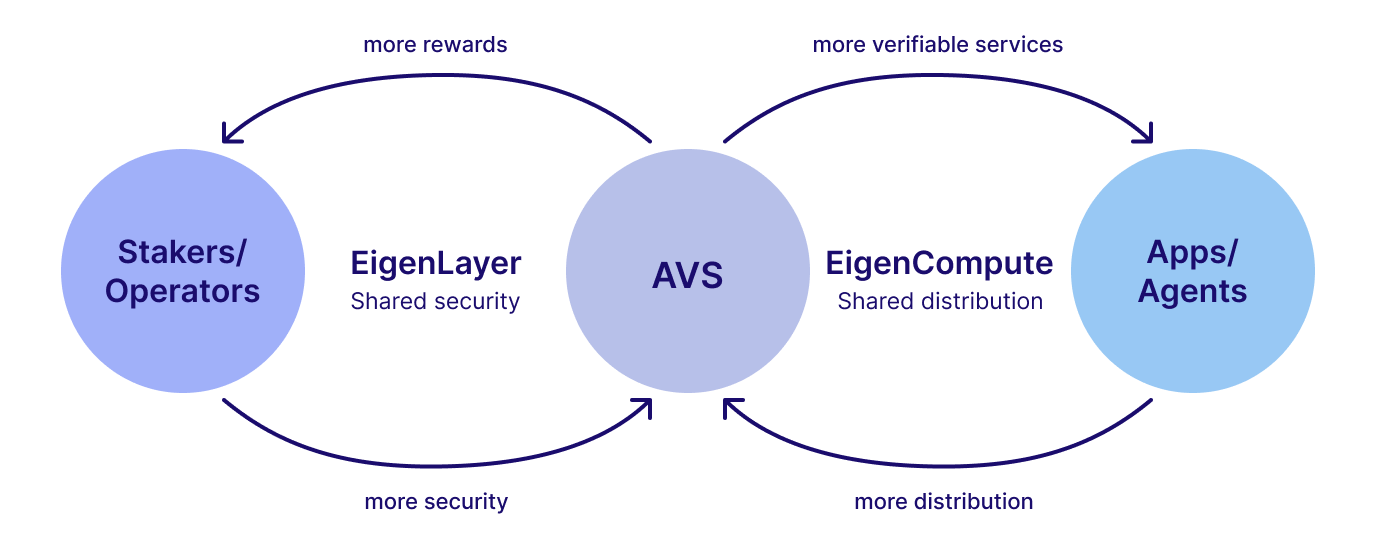
EIGEN Value Accrual: The EIGEN token secures EigenCloud's core primitives and applications built on them and may receive compensatory rewards, similar to how L1 tokens are staked to secure traditional blockchain networks.
The Potential: Applications Never Before Possible
EigenCloud enables entirely new categories of verifiable applications by combining on-chain token logic with off-chain programmability. Here are examples that showcase what becomes architecturally feasible:
AI and Agent Applications
Insured AI Agents: Autonomous agents that can hold funds, make decisions, and interact with external systems while remaining economically bonded to their actions. Booking agents, trading bots, and service providers become trustworthy through cryptoeconomic accountability rather than reputation alone.
Sovereign AI Agents with Wealth Shares: AI systems that can raise capital by issuing tokenized ownership stakes, with verifiable execution ensuring the specific model (not an imposter) controls the funds. This enables AI agents to bootstrap funding for ambitious projects.
Verifiable AI Governance: Protocol governance augmented by AI systems that can evaluate proposals, aggregate community preferences, and execute complex governance logic—all with cryptoeconomic verification of the AI's decision-making process.
Financial and Economic Applications
Verifiable DeFi Vaults: Complex trading algorithms and risk management strategies that require external data, machine learning, and high-performance computation—all with cryptoeconomic security backing. The off-chain logic is security-critical since it moves user tokens, but traditional smart contracts can't handle the computational complexity.
Verifiable Pricing Covenants: On-chain ride-sharing, task marketplaces, and gig economy platforms with cryptographically enforced take-rate limits. Upgrades that violate pricing commitments are automatically rejected by intersubjective verification, creating unruggable service guarantees.
Verifiable Climate Credits: Carbon offset markets with satellite imagery verification, AI-powered forest cover analysis, and cryptographic proofs—eliminating double-counting and enabling global carbon trading with mathematical precision.
Social and Media Applications
Verifiable Social Media Incentives: Memecoin economics tied to verified social media engagement, where token inflation rewards are distributed based on cryptographically verified posting behavior and reach metrics. No more bot farms or fake engagement.
Verifiable Community Notes: Decentralized content moderation with economic consequences, where community feedback triggers on-chain slashing for repeated misinformation. Combines social consensus with cryptoeconomic enforcement.
Verifiable Media and Feed Curation: News platforms where articles carry cryptographic proofs of source integrity, location verification, and unbiased AI curation—solving fake news through verifiability rather than centralized fact-checking.
Enterprise and Infrastructure
Verifiable Data Onramps: Enterprise applications can prove the integrity of data imported from Web2 systems, enabling blockchain applications to trustlessly consume traditional databases, APIs, and business systems.
Verifiable Supply Chains: Food, diamond, and commodity tracking with sensor integrity proofs, location verification, and cryptographic audit trails—creating unfiltered transparency for global supply networks.
Verifiable Credit Scoring: Lending protocols backed by cryptographically verified credit assessments, where AI models analyze verifiable data sources to generate trust scores that can be used as collateral.
Prediction and Gaming Markets
Permissionless Prediction Markets: Markets that can resolve based on any real-world outcome—Twitter announcements, election results, sports scores—using intersubjective verification to handle subjective disputes while maintaining cryptoeconomic finality.
Location-Based Verifiable Games: AR games and location-based applications where players receive cryptoeconomic rewards for verified real-world actions, with sensor integrity and location proofs preventing spoofing.
Verifiable Casinos: Online gambling applications with provable randomness, verifiable game logic, and cryptoeconomic guarantees—eliminating the massive trust assumptions that plague current platforms. Complex game mechanics run off-chain while maintaining full verifiability.
This represents crypto's evolution from verifiable finance to the verifiable economy, targeting applications across the $10+ trillion public cloud and software markets that require both programmability and trust. These examples only scratch the surface of what becomes possible when any developer can combine cloud-scale programmability with crypto-grade verifiability.
Get Started
EigenCloud access is rolling out to developers in waves throughout 2025. EigenDA is live on mainnet today. EigenVerify is live in devnet, with mainnet by Q3 2025. EigenCompute enters devnet by Q3, with mainnet by Q4 2025.
Developers can start building today by exploring EigenLayer's AVS ecosystem, with over 200 services live or in development. As EigenCloud primitives launch, existing EigenLayer developers will have priority access to new capabilities.
The verifiable cloud is here. The only question is what you'll build with it.
Get Early Access: Request access to previews of EigenVerify or EigenCompute by connecting with our team
Go Deeper: Read the EigenCloud Whitepaper, visit eigencloud.xyz, and follow us on X @eigenlayer and @buildoneigen
